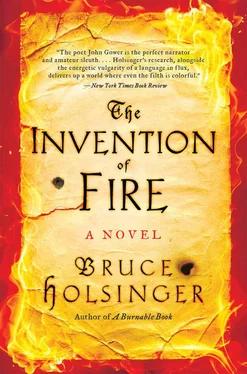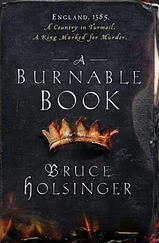Bruce Holsinger - The Invention of Fire
Здесь есть возможность читать онлайн «Bruce Holsinger - The Invention of Fire» — ознакомительный отрывок электронной книги совершенно бесплатно, а после прочтения отрывка купить полную версию. В некоторых случаях можно слушать аудио, скачать через торрент в формате fb2 и присутствует краткое содержание. Год выпуска: 2015, Издательство: HarperCollins, Жанр: Исторический детектив, на английском языке. Описание произведения, (предисловие) а так же отзывы посетителей доступны на портале библиотеки ЛибКат.
- Название:The Invention of Fire
- Автор:
- Издательство:HarperCollins
- Жанр:
- Год:2015
- ISBN:нет данных
- Рейтинг книги:3 / 5. Голосов: 1
-
Избранное:Добавить в избранное
- Отзывы:
-
Ваша оценка:
- 60
- 1
- 2
- 3
- 4
- 5
The Invention of Fire: краткое содержание, описание и аннотация
Предлагаем к чтению аннотацию, описание, краткое содержание или предисловие (зависит от того, что написал сам автор книги «The Invention of Fire»). Если вы не нашли необходимую информацию о книге — напишите в комментариях, мы постараемся отыскать её.
The Invention of Fire — читать онлайн ознакомительный отрывок
Ниже представлен текст книги, разбитый по страницам. Система сохранения места последней прочитанной страницы, позволяет с удобством читать онлайн бесплатно книгу «The Invention of Fire», без необходимости каждый раз заново искать на чём Вы остановились. Поставьте закладку, и сможете в любой момент перейти на страницу, на которой закончили чтение.
Интервал:
Закладка:
I spoke the name. “Hawkwood.”
“With Simon Gower as his willing agent.”
I turned away from him, my eyes closed against the truth.
“Sir John’s most bloody-minded men,” Rune went on in a smooth voice, taking a sharp pleasure in what he was telling me. “Twenty of them, English men all, shipped up months ago for special missions on behalf of the Tower. In matters such as these it’s best to have native men operating on native soil, able to mask themselves according to the needs of the day. Men without faction or favorites. Men like yourself, Gower. And your cooperative son, who arranged for the hire of Hawkwood’s men.”
My eyes came open, cast to the ground. A shudder ran from my heart to the extremities of my limbs. Rune, then, had known of Simon’s involvement in hiring the mercenary company when he sent me over to Calais and the Pale-perhaps even earlier.
I looked up at the treacherous man, my vision cloudy and faint, and only then did I comprehend the depth of it.
He had already read my darkest thoughts. “That was my notion, you know, to bring you into this from the start,” he said. “Ralph Strode is a cooperative fellow, with a bushel of wisdom, and equal faith in the goodness of the crown. He took my suggestion, didn’t he? And you have been quite useful, Gower, snouting up all the dungpiles I’ve left for you along the way. Swans, powder, badges, banners, guns-even a feigned attempt on your life in Calais to convince you of the urgency of the matter. How fitting, to have the father of my intermediary with these mercenaries, looking into the very deaths they brought about!”
His laughter rang thinly through the seld as I swallowed these bitter truths. I thought of Strode’s sober words in the St. Bart’s churchyard all those weeks ago, the sixteen bodies in a morbid line-and John Gower summoned there to perform a role already scripted by the man responsible.
There was a clamor from Cheap. We would not be alone for long. Rune stepped toward me, ready to plunge his sword into my chest. But I had to know. I struggled over a bench, flattening myself against the back wall of a closed shop. “Did Simon know the attempt on me was a ruse?” Did he think he was saving my life?
Rune smiled. “Some secrets are best left unrevealed, Gower. As you know very well.”
Whatever the truth, Simon, once again, had played both sides, following Rune’s orders while just as blind as his father to their full motivation-or so I had to hope. My son’s endless capacity to deceive roused me to wonder.
“The shootings in the woods,” I said, stepping to the side, playing for more time, following Rune’s chain of revelations. “It was a test, an assay. Snell was testing guns.”
“Not only guns,” said Rune. “People.”
“People? Yet how-”
“These handgonnes are new to our world, Gower. They require new strategies, new tactics of war.” He waved his sword through the air, distracted for a saving moment by his pride. “We know how longbowmen will react in the heat of battle. How speedily a great archer can nock an arrow, how many bowmen to send along an enemy’s flank. Yet we know very little about small guns, how they’ll fare in the bloody milieu of battle and siege. The element of terror and noise they might provoke in a village or city. Their degree of accuracy on a target relative to distance and quality of powder. Even how quickly they can be loaded and fired by one man. Or one woman.”
“So you tested them.” I felt sickened.
“Lions, prisoners, a pile of scrap lumber,” said Rune. “A target is a target as far as Snell is concerned. Now, as for your role in-”
A flash of metal from the north side of the seld. “Drop your sword, Rune.”
I looked left. Nicholas Brembre, blade drawn, four archers at his side. Behind them cowered Jack Norris. His eyes were wide as ale-jars, his face red beneath his uncapped head, his stubs ugly and aflame with exertion, yet I had never beheld a more welcome sight.
Now a movement to my right. Thomas of Woodstock, his sword drawn, and two of his own men armed with long knives. They had entered the seld from the south, the direction of Warwick Street. The two great men stood opposed, Rune and I the third point in a triangle.
“And yours, Sir Nick,” said the duke, though it was all bluster on his part. Brembre had four nocked arrows in his corner of the seld. Two were pointed at Rune, two at the duke and his men.
“You are mayor for but another hour, Nicholas,” said Rune, a pleading note in his voice. “We are king’s men both. Take the duke’s life, not mine, and this whole affair will be behind us.”
I watched Rune’s eyes, their frantic shifts from side to side. The earl’s counselor was attempting to get Brembre on his side against Gloucester, the king’s chief opponent. If the duke were killed in the day’s civic melee, the mayor’s principal enemy in the realm would be eliminated, with no one the wiser. Brembre hesitated, the calculation visible in his narrowed eyes.
Then Brembre made his decision. He shook his head just slightly. Rune saw the refusal in his gesture as the four archers all took aim. He leapt, his sword tracing an arc from my chest to Brembre’s. Two arrows took Rune in the throat, another in the left eye. The fourth clattered harmlessly on the wall behind me. Rune fell, his sword dropping from his hand as he clutched at his face and neck, his life leaking out around the shafts.
Brembre squatted over the man’s body. He looked up at Gloucester, who gestured for his men to lower their weapons.
“Dead, or soon to be,” Brembre said.
“I am surprised, Lord Mayor,” said the duke as the standoff ended, weapons sheathed and quivered. “Your man had me at the end of his arrow, helpless as a doe. Why would you spare me?”
Brembre considered his response. “You are guilty of many things, Your Grace. Treason is not one of them.”
The duke’s face showed surprise. He inclined his head.
“And I trust you will recall my forbearance in the coming months,” said Brembre. “His Highness the king requires our loyalty and commands our restraint. I for one intend to grant him mine.” And he returned Gloucester’s nod.
I looked at the duke, saw Rykener’s confession and the evidence of Brembre’s vice swirling in his calculating eyes.
It was a remarkable moment. Nicholas Brembre’s third term as mayor was to expire officially later that morning, when Exton presented himself at Westminster. Yet in that final hour he had committed the most selfless act of his rule: sparing the life of the magnate who most fervently wished him dead, and thereby preventing heightened strife between the lords and the king, a civil war, perhaps even a royal deposition. Years later, in thinking back on the events of that autumn, I would marvel at how differently King Richard’s reign might have turned out had Brembre’s arrows flown.
“You have shown yourself worthy of your title, Lord Mayor,” said the duke.
“Staying my hand was hardly an act of nobility, Woodstock.” Brembre’s nose rang out a final mayoral sniff. “Civil war is always bad for trade.”
Chapter 48
Footsteps, on the inner stairs. She was not alone in the house after all. Was it Rose Lipton, or one of the servants?
“Who’s there?” she called out weakly. Floorboards moaned, a shadow fell across the doorway, and Stephen Marsh appeared at the end of the gallery. His mouth gaped. He stared at her. Hawisia was too gone with pain in that moment to think about what his presence at Stone’s might mean. She could scarcely speak.
“Do not come within, Stephen,” she said, shaking her head and showing him a palm. “Birthing time. You must leave me.” He wouldn’t dare violate her privity, would he? He looked more frightened than she was as he stood there dumbly, the mute sheepdog. He needed a task.
Читать дальшеИнтервал:
Закладка:
Похожие книги на «The Invention of Fire»
Представляем Вашему вниманию похожие книги на «The Invention of Fire» списком для выбора. Мы отобрали схожую по названию и смыслу литературу в надежде предоставить читателям больше вариантов отыскать новые, интересные, ещё непрочитанные произведения.
Обсуждение, отзывы о книге «The Invention of Fire» и просто собственные мнения читателей. Оставьте ваши комментарии, напишите, что Вы думаете о произведении, его смысле или главных героях. Укажите что конкретно понравилось, а что нет, и почему Вы так считаете.












